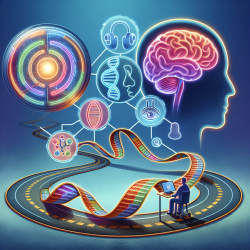Introduction
Intellectual disability (ID) is a complex neurodevelopmental disorder characterized by impaired intellectual and adaptive functioning. Affecting approximately 2-3% of the population, ID presents a significant challenge for both diagnosis and treatment. Recent advancements in genetic research, particularly the study titled Phenotypic and genotypic characterization of families with complex intellectual disability identified pathogenic genetic variations in known and novel disease genes, provide new insights into the genetic underpinnings of ID.
Key Findings from the Research
The study conducted a detailed clinical characterization and genomic analysis of seven families with neurodevelopmental disorders (NDDs). Using high throughput SNP-based genotyping and whole-genome sequencing (WGS), researchers identified both known and novel mutations in several genes associated with ID. Notably, a novel disease gene, NSL1, was discovered, which may play a crucial role in the development of complex ID.
Implications for Practitioners
For practitioners, these findings underscore the importance of integrating genetic insights into clinical practice. Here are some practical steps:
- Enhanced Diagnostic Strategies: Utilize genetic testing to identify specific mutations in patients with ID, which can aid in more accurate diagnoses and personalized treatment plans.
- Interdisciplinary Collaboration: Work closely with geneticists to interpret genetic data and understand its clinical implications, fostering a more comprehensive approach to patient care.
- Continued Education: Stay informed about the latest genetic research and its applications in neurodevelopmental disorders to continually improve therapeutic outcomes.
Encouraging Further Research
The discovery of novel genetic mutations in this study highlights the vast potential for further research in the field of intellectual disabilities. Practitioners are encouraged to engage in collaborative research efforts and contribute to the growing body of knowledge that can lead to more effective interventions.
Conclusion
Integrating genetic research into clinical practice offers promising avenues for improving the diagnosis and treatment of intellectual disabilities. By embracing these advancements, practitioners can enhance their skills and contribute to better outcomes for children with NDDs.
To read the original research paper, please follow this link: Phenotypic and genotypic characterization of families with complex intellectual disability identified pathogenic genetic variations in known and novel disease genes.










